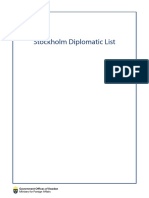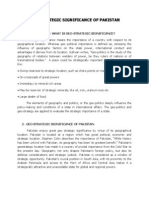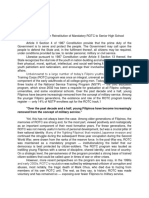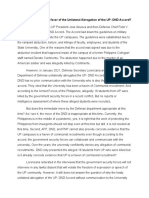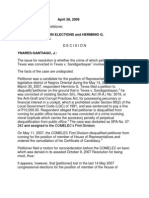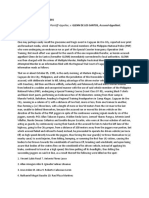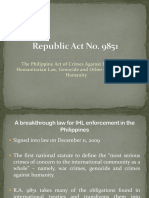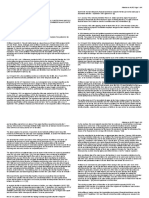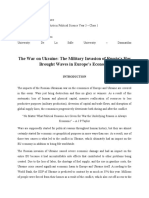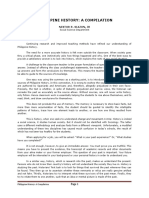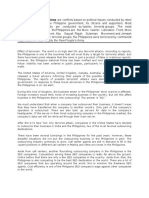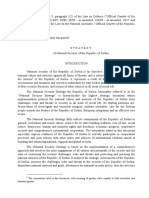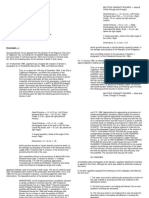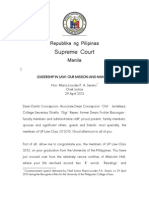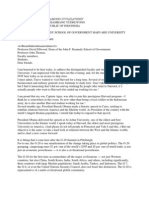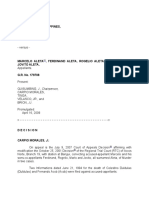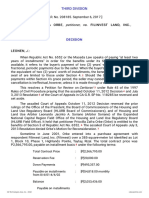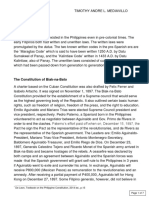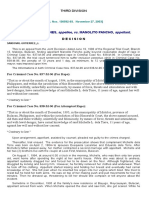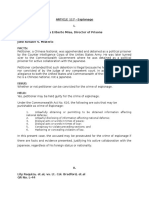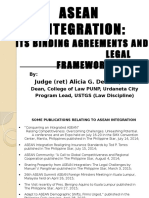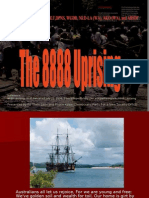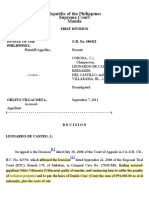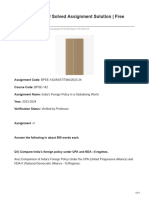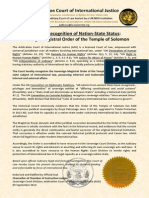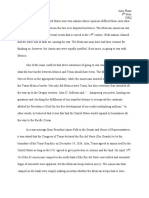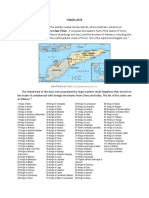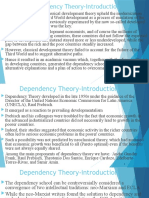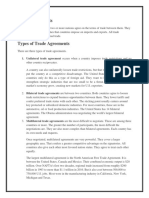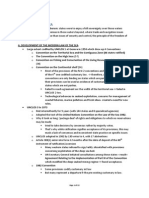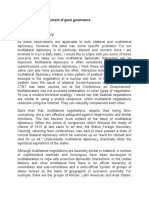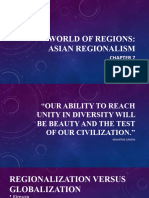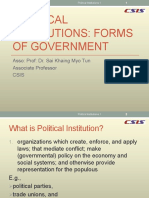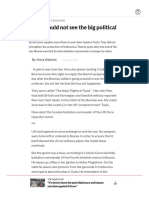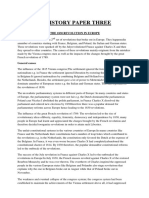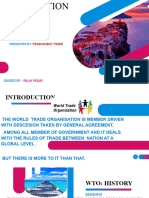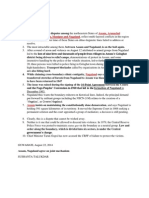National Security
National Security
Uploaded by
Jonathan FernandesCopyright:
Available Formats
National Security
National Security
Uploaded by
Jonathan FernandesOriginal Description:
Copyright
Available Formats
Share this document
Did you find this document useful?
Is this content inappropriate?
Copyright:
Available Formats
National Security
National Security
Uploaded by
Jonathan FernandesCopyright:
Available Formats
National Security Philippines major concern for national security is to build a safe and a strong regional neighborhood using
ASEAN. Through this, the country may engage with regional powers such as China, India, Japan, South Korea, Australia, New Zealand, and Indonesia in mutually beneficial security dialogues. Also, the country should engage in vibrant relations with countries in the Middle East in resolving the Mindanao problems, Palestinian issues, and global terrorism. According to Timberman, D. (1998) the Philippines' national security is founded ultimately on the nation's economic strength, political unity and social cohesion. Like many other countries--including the United States--the Philippines has redefined its security increasingly in economic terms. To which is true in present day situation wherein larger appropriation of budget is given to military by the Philippine government to increase its security capabilities, especially with the heightening dispute against China. China's claim to the Spratlys chain of islets, reefs, and cays in the South China Sea--which it disputes with Brunei, Malaysia, the Philippines, Taiwan, and Vietnamseems to hinge on two things: the oil resources the area is believed to contain and China's new military strategy of "forward defense." China's need for new oil fields has become more and more urgent--it became a net importer in 1994and this resource the Spratly Islands are believed to contain in large quantities. The Philippine government sees no substitute for consultations that produce a consensus among the six littoral states claiming portions of the Spratly Islands. Chinese leaders have several times reassured the Philippines that China poses no threat to the
growth and stability of the Asia-Pacific. But the Philippines is still not completely at ease in its bilateral relationship with China. Timberman said that the Beijing's continued encroachments on the South China Sea will surely accelerate security cooperation among the Southeast Asian states and between them and the United States. However, with its members claims as the Philipinnes present situation doesnt show a comprehensive security cooperation between ASEAN states. The U.S. remains as one of only two strategic partners of the Philippines and its only treaty ally. In fact, one of the points discussed in 2+2 meeting is the traty alliance, defense, and security partnership between the two. Territorial dispute with China regarding Spratlys islands should be the concern of all the powers interested in the stability of the South China Sea and its strategic sealanes. Chinese f ishermen had been blatantly destroying biodiversity there by harvesting large volumes of endangered species. This is a gross violation of our Fisheries Code and of the International Convention. Japan, Australia, South Korea, EU, and the United States have taken the position that China and the Philippines should validate their respective claims in accordance with international law including UNCLOS. The Presidents latest state visit to China seperated the West Philippine Sea issue from their trade agreement. But still, the Philippines wants to solve the issue diplomatically.
Economic Security The platform of the President is to lift people up from poverty, expand their choices, and increase the opportunities available to them as well as their capabilities
to respond., through good governance. DFAs role is to undertake a planned program for generating foreign investment, boosting trade, increasing tourism, and enhancing possible official development assistance. Philippines economic ties with ASEAN member, with the Spratlys claimant China, Japan, and the United States promote trade reciprocity between the country and the mentioned states. Since then until today, almost nothing differs on the relationship between Philippines and the mentioned states.
Protecting Filipinos overseas The report boasts the repatriation of over 10,000 Filipinos f rom many countries including Libya, Syria, Bahrain, Yemen, Iraq, and Japan., and the assistance in the release of nearly 800 seaf arers who have been held hostage by pirates in Somalia. The country promotes better relationship with the United States, not only economically, but also, in safeguarding the citizens of each state on each others territories.
Q2: Provide and discuss a major challenge (only one) that confronts Philippine Foreign Relations today. Elaborate on the reasons why it is insurmountable to begin with. Suggest recommendations on how to arrest the difficulty and confront the challenges it poses to pave the way that foreign relations ought to thread.
Indubitably, the main foreign problem the country is encountering today (even decades ago) is the territorial dispute of Spratly islands against claimant states, specifically China. Simply, Philippines have less economic and military utilities against China in protecting the disputed territory which is closest to our country. Hence, while it seems that, based on international law, we have a better stand point on claiming the islands, we still cannot do it, again, simply because China is much stronger than our country. Our country can solve the issue through diplomacy, with the help of the United Nations. However, China being a permanent member of the Security Council makes things harder
You might also like
- Introduction To Politics and International Relations PDFDocument52 pagesIntroduction To Politics and International Relations PDFyikil2100% (1)
- 01 Stat Con Prelim NotesDocument6 pages01 Stat Con Prelim NotesMarc CosepNo ratings yet
- Diplomatic ListDocument174 pagesDiplomatic ListbenzinoaloneNo ratings yet
- Geo Strategic Significance of PakistanDocument10 pagesGeo Strategic Significance of Pakistantassawarrehman184% (19)
- CSCDocument7 pagesCSCJustin Reden BautistaNo ratings yet
- House Minority Leader Stephen Paduano 2021 contra-SONADocument25 pagesHouse Minority Leader Stephen Paduano 2021 contra-SONARapplerNo ratings yet
- PositionPaper - de La PenaDocument2 pagesPositionPaper - de La PenaDorothy Ann Dela PeñaNo ratings yet
- The Spratly Islands Dispute - International Law Conflicting ClaimDocument100 pagesThe Spratly Islands Dispute - International Law Conflicting ClaimAngeloReyesSo100% (1)
- G.R. No. 188602 February 4, 2010Document3 pagesG.R. No. 188602 February 4, 2010Wennonah Marie RabusaNo ratings yet
- Teves V ComelecDocument26 pagesTeves V ComelecHowieking15100% (1)
- Regular CourtDocument5 pagesRegular CourtMNo ratings yet
- G.R. No. 131588. March 27, 2001 PEOPLE OF THE PHILIPPINES, Plaintiff-Appellee, v. GLENN DE LOS SANTOS, Accused-Appellant. Decision Davide, JR., C.J.Document2 pagesG.R. No. 131588. March 27, 2001 PEOPLE OF THE PHILIPPINES, Plaintiff-Appellee, v. GLENN DE LOS SANTOS, Accused-Appellant. Decision Davide, JR., C.J.Felix Gabriel BalaniNo ratings yet
- IHL ReportDocument31 pagesIHL ReportHyman Jay BlancoNo ratings yet
- Aldovino Vs NLRCDocument4 pagesAldovino Vs NLRCJMF1234No ratings yet
- PSCI340 Asian Politics Syllabus 02252019Document10 pagesPSCI340 Asian Politics Syllabus 02252019julianasheNo ratings yet
- Instructional Module: Republic of The Philippines Nueva Vizcaya State University Bayombong, Nueva VizcayaDocument12 pagesInstructional Module: Republic of The Philippines Nueva Vizcaya State University Bayombong, Nueva VizcayaMIGNONETTE ERIM DULAYNo ratings yet
- People VS QuianzonDocument2 pagesPeople VS QuianzonGroot GrootNo ratings yet
- Appellant, vs. Shell Company of The Philippine Islands, LTD., Defendant-Appellee, Yek Hua TradingDocument2 pagesAppellant, vs. Shell Company of The Philippine Islands, LTD., Defendant-Appellee, Yek Hua TradingKevin Patrick Magalona DegayoNo ratings yet
- The War On Ukraine The Hard Power of Russia's Invasion Has Brought Waves in Europe's EconomyDocument9 pagesThe War On Ukraine The Hard Power of Russia's Invasion Has Brought Waves in Europe's EconomyHans HenaveNo ratings yet
- Rethinking Radical Democracy Between Abundance and LackDocument13 pagesRethinking Radical Democracy Between Abundance and LackRadikal DemokrasiNo ratings yet
- Book2 (CLJ4)Document65 pagesBook2 (CLJ4)Christopher PerazNo ratings yet
- RA 11188 Special Protection of CIACDocument22 pagesRA 11188 Special Protection of CIACggeron1417No ratings yet
- Evidence Cases 2Document183 pagesEvidence Cases 2Abigail AnziaNo ratings yet
- Phil History, A CompilationDocument39 pagesPhil History, A CompilationIndira PrabhakerNo ratings yet
- 02 Crimes Against National Security - Law of The StateDocument21 pages02 Crimes Against National Security - Law of The StateJun Bill CercadoNo ratings yet
- Terrorism in The PhilippinesDocument5 pagesTerrorism in The PhilippinesRichard John0% (1)
- International Crisis Group: The Philippines: Counter-Insurgency vs. Counter-Terrorism in MindanaoDocument38 pagesInternational Crisis Group: The Philippines: Counter-Insurgency vs. Counter-Terrorism in MindanaoBong MontesaNo ratings yet
- Strategy of National Security of The Republic of SerbiaDocument34 pagesStrategy of National Security of The Republic of SerbiaAerokosmonautikaNo ratings yet
- The Coming of The United StatesDocument10 pagesThe Coming of The United StatesPAULEE VLOGZNo ratings yet
- People v. Tac-An 182 SCRA 601Document9 pagesPeople v. Tac-An 182 SCRA 601Anna Kristina Felichi ImportanteNo ratings yet
- G.R. No. L-409 January 30, 1947 ANASTACIO LAUREL, Petitioner, ERIBERTO MISA, RespondentDocument12 pagesG.R. No. L-409 January 30, 1947 ANASTACIO LAUREL, Petitioner, ERIBERTO MISA, RespondentLeah Marie SernalNo ratings yet
- Ambition Destiny Victory: The Gibo Chapter PreviewDocument5 pagesAmbition Destiny Victory: The Gibo Chapter PreviewrayviNo ratings yet
- Isaac Newton BiographyDocument2 pagesIsaac Newton BiographyGeorgiaNo ratings yet
- CJ Sereno PDFDocument12 pagesCJ Sereno PDFJohn MenguitoNo ratings yet
- Estrada V DesiertoDocument4 pagesEstrada V DesiertoBudjoy LazoNo ratings yet
- Expanding The Role of Philippine Languages in The Legal System: The Dim ProspectsDocument14 pagesExpanding The Role of Philippine Languages in The Legal System: The Dim ProspectsNiala AlmarioNo ratings yet
- AAA Flores Vs PeopleDocument5 pagesAAA Flores Vs PeopleYeshua TuraNo ratings yet
- Marcos AdministrationDocument5 pagesMarcos AdministrationHayden PalmaNo ratings yet
- Foreign PolicyDocument14 pagesForeign PolicyGemma CruzNo ratings yet
- Readings in Philippine HistoryDocument4 pagesReadings in Philippine HistoryrotashennettejewelpNo ratings yet
- Policy Paper SampleDocument6 pagesPolicy Paper SampleLesnalef TerronesNo ratings yet
- Sby Speech Towards Harmony Among CivilizationsDocument9 pagesSby Speech Towards Harmony Among CivilizationsAdib Jasni KharismaNo ratings yet
- Analysis of The Archipelagic Doctrine in The New Convention On The Law of The SeaDocument10 pagesAnalysis of The Archipelagic Doctrine in The New Convention On The Law of The SeaEdlyn Favorito RomeroNo ratings yet
- Second Division People of The PhilippinesDocument187 pagesSecond Division People of The PhilippinesLuigi JaroNo ratings yet
- East Timor and The New Humanitarian Interventionism: International Affairs December 2002Document24 pagesEast Timor and The New Humanitarian Interventionism: International Affairs December 2002korea madafakaNo ratings yet
- Constitutional Law CasesDocument3 pagesConstitutional Law CasesApple Gee Libo-onNo ratings yet
- FactsDocument1 pageFactsma. vidiaNo ratings yet
- 210948-2017-Orbe v. Filinvest Land Inc.Document21 pages210948-2017-Orbe v. Filinvest Land Inc.Elimer Teves EspinaNo ratings yet
- Evolution of Philippine LawDocument7 pagesEvolution of Philippine LawTimothy Andre MediavilloNo ratings yet
- Case 20 - People v. Pancho, G.R. Nos. 136592-93Document8 pagesCase 20 - People v. Pancho, G.R. Nos. 136592-93Jo-Al GealonNo ratings yet
- The History of The 1987 ConstitutionDocument7 pagesThe History of The 1987 Constitutionernesto pitogo100% (1)
- Crim Cases To DigestDocument2 pagesCrim Cases To DigestDegard100% (1)
- Magna Carta of WomenDocument11 pagesMagna Carta of WomenJowey CelzoNo ratings yet
- Group 4 Crim2 - Art. 117, 127 & 136Document13 pagesGroup 4 Crim2 - Art. 117, 127 & 136Jani Misterio100% (1)
- Professional Services Software: Philippine Supreme Court JurisprudenceDocument40 pagesProfessional Services Software: Philippine Supreme Court JurisprudenceSarah Jade LayugNo ratings yet
- The Contributions of Other Coalition Members Other Than The United States and United Kingdom in The First Gulf WarDocument11 pagesThe Contributions of Other Coalition Members Other Than The United States and United Kingdom in The First Gulf WarCheng Heng EngNo ratings yet
- Asean Integration:: Its Binding Agreements and Legal Framework Its Binding Agreements and Legal FrameworkDocument17 pagesAsean Integration:: Its Binding Agreements and Legal Framework Its Binding Agreements and Legal FrameworkhermieNo ratings yet
- G.R. No. 127754Document8 pagesG.R. No. 127754jericglennNo ratings yet
- The 8888 Uprising (Master)Document42 pagesThe 8888 Uprising (Master)phonekyaw0% (1)
- People V Villacorta, GR 186412 September 7, 2011Document15 pagesPeople V Villacorta, GR 186412 September 7, 2011anjNo ratings yet
- Estrada Vs DesiertoDocument53 pagesEstrada Vs DesiertoJames PagdangananNo ratings yet
- The FamilyDocument23 pagesThe FamilyJorge Ang100% (1)
- Philippines in Between Two Clashing HegemonsDocument3 pagesPhilippines in Between Two Clashing HegemonsTheresa PrudencioNo ratings yet
- BPSE-142 IGNOU Solved Assignment SolutionDocument12 pagesBPSE-142 IGNOU Solved Assignment Solutionrhabeeb212No ratings yet
- 0 Baselines Presentation.Document31 pages0 Baselines Presentation.Aleezah Gertrude RaymundoNo ratings yet
- SYLVESTER, C. Feminist International Relations PDFDocument369 pagesSYLVESTER, C. Feminist International Relations PDFYunna D'AvilaNo ratings yet
- Court Recognition of Knights Templar OrderDocument1 pageCourt Recognition of Knights Templar OrderIgnita Veritas University Law CentreNo ratings yet
- DBQ - Was The United States Justified in Going To War With MexicoDocument3 pagesDBQ - Was The United States Justified in Going To War With MexicoAmy Pham0% (2)
- UNO and Its OrgansDocument18 pagesUNO and Its OrgansAnushka Shah100% (2)
- East Timoreast Timor.: Encyclopædia Britannica, IncDocument3 pagesEast Timoreast Timor.: Encyclopædia Britannica, IncWeee WardNo ratings yet
- Objectives: Activities Powerpoint Presentation Participant Manual Handouts Trainer ResourcesDocument20 pagesObjectives: Activities Powerpoint Presentation Participant Manual Handouts Trainer ResourcesSatyam PathakNo ratings yet
- Dependency Theory and WSTDocument41 pagesDependency Theory and WSTAminul QuayyumNo ratings yet
- Trade AgreementsDocument9 pagesTrade AgreementsHammad NaeemNo ratings yet
- Robert S. Ross (Editor), Alastair Iain Johnston (Editor) - New Directions in The Study of China's Foreign Policy-Stanford University Press (2006)Document498 pagesRobert S. Ross (Editor), Alastair Iain Johnston (Editor) - New Directions in The Study of China's Foreign Policy-Stanford University Press (2006)Tudor Cherhat100% (1)
- DDIP (1) 1 1 1Document12 pagesDDIP (1) 1 1 1Agung AfifNo ratings yet
- THE Banana WAR: International Trade LAWDocument22 pagesTHE Banana WAR: International Trade LAWAanchal KashyapNo ratings yet
- Single Integrated Operational PlanDocument13 pagesSingle Integrated Operational PlanMarian HarapceaNo ratings yet
- The Law of The SeaDocument22 pagesThe Law of The SeaElizabeth Lau100% (3)
- Diplomacy As An Instrument of Good GovernanceDocument4 pagesDiplomacy As An Instrument of Good GovernanceZachary ColonNo ratings yet
- Chapter 7Document20 pagesChapter 7vybetrendz51No ratings yet
- Political InstitutionsDocument25 pagesPolitical Institutionsdavid tuhkawng100% (1)
- "We Would Not See The Big Political Game": By: Maria WidehedDocument18 pages"We Would Not See The Big Political Game": By: Maria WidehedGaryBurlesonNo ratings yet
- Classical RealismDocument24 pagesClassical Realismfarirehman98No ratings yet
- S5 HISTORY Paper 3 NOTES REVOLUTION IN EUROPEDocument68 pagesS5 HISTORY Paper 3 NOTES REVOLUTION IN EUROPEjoze7hanNo ratings yet
- CBSE Class 12 Political Science Sample Paper-02Document5 pagesCBSE Class 12 Political Science Sample Paper-02cbsesamplepaperNo ratings yet
- Pil Notes Stanzin SirDocument68 pagesPil Notes Stanzin SirNitesh DalalNo ratings yet
- Nnirbhay PPT Wto 2Document8 pagesNnirbhay PPT Wto 2NIRBHAY PANDEYNo ratings yet
- Assam Nagaland Border DisputeDocument2 pagesAssam Nagaland Border Disputekapy_123No ratings yet
- Imf DM Export 20210930Document30 pagesImf DM Export 20210930Mayra GalvezNo ratings yet
- Difference Between International Relatio PDFDocument2 pagesDifference Between International Relatio PDFठाकुर अनिकेत प्रताप सिंहNo ratings yet


